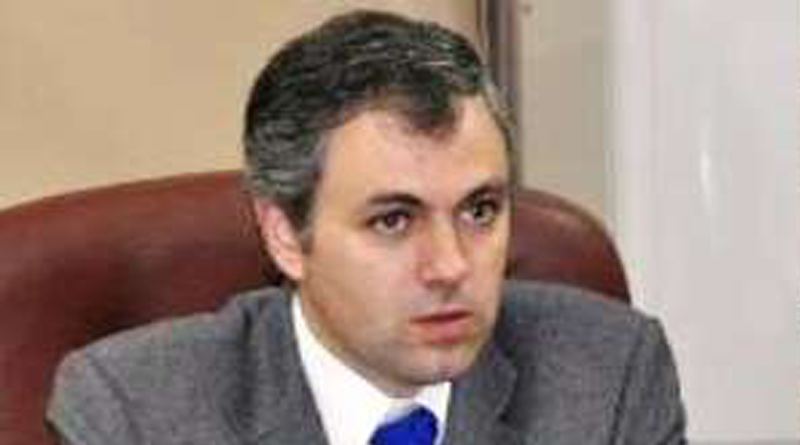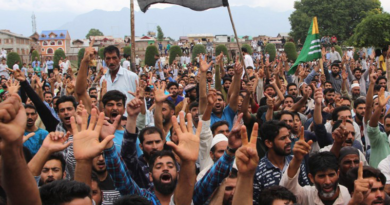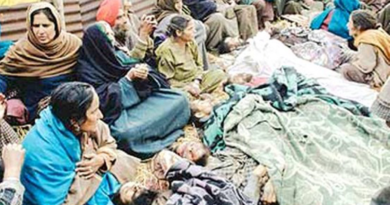Omar Abdullah’s Statement is Potentially Very Dangerous
The National Conference president Mr Omar Abdullah in his first election meeting at Budgam on 22nd October has made an important political statement de-linking the election process from the resolution of Kashmir dispute. He said: “The elections will not have any effect on Kashmir issue. And whether people participate in elections or not, it will not affect resolution of Kashmir issue…” He further emphasized that the Kashmir dispute and the daily problems of Kashmiris were two different issues and they should not be clubbed together.
Let us start with understanding the dangerous potential of what Mr. Abdullah has said. We will build up a real life scenario here to see exactly how the logic of his statement really works out. Think of a common Kashmiri person or what is often referred to as ‘man on the street’. We will call this person ‘Gulla’. He does not have any strong political views but like all other common men and woman of Kashmir is not integrated with India and does not like to be part of it. To him Kashmir issue matters, and his sympathies are decisively with the ongoing freedom movement. He has decided not to vote as he has been told elections are not a substitute for referendum, and, therefore, not a solution to Kashmir issue. Now, he comes across what Mr. Abdullah says (let us visualize a dialogue going on here):
Mr. Abdullah: Gulla, why don’t you vote for us in the forthcoming elections
Gulla: How can I, this is just an election, not a referendum, and it cannot be solution to our problem, I mean Kashmir problem.
Mr. Abdullah: Absolutely right, that is exactly what I have been saying. Elections are one thing, and Kashmir issue is another, don’t mix up the two. If you boycott the elections, that will not make any difference to Kashmir issue, how can it, because the two are unrelated, and, alternatively, if you participate, that too will not make a difference because you can’t solve Kashmir problem through elections, but a difference will have been made elsewhere: Roads and bridges will come up.
My insight into Gulla’s capacity of drawing the ultimate conclusions(after he ponders over what Mr. Abdullah told him, and discusses it in his own circle, most likely, in a routine meeting at the barber’s shop in the evening) makes me comfortably believe that Gulla will not get into the trap, he will not go to polling booth. Gulla would have been saved by intuition, but we cannot leave things to that, particularly when it comes to politics and political combat situations, so a thorough analysis of Mr. Abdullah’s argument is required.
De-linking Kashmir issue and/or its resolution from elections is basically a fallacious argument, and we will discuss in a moment why, but at the same time, it is highly misleading. As should be evident from the dialogue above, Mr. Abdullah’s statement might create an impression that he is now saying the same thing as the APHC (both M and G) have been, but that is not true. There is a fundamental difference: APHC is saying, and that too in response to India’s attempts at projecting elections as proof of peoples’ acceptance of India’s rule over Kashmir, that elections are not a referendum, and, therefore, India should not come up with an election schedule when people are demanding freedom. The resolution of Kashmir issue is not linked to elections. That is where the APHC argument ends. It does not say elections are not linked to Kashmir issue, how can it, because they are. Elections—their process, the campaign, and the results—all have a crucial bearing on the freedom politics, and potentially a huge negative impact. If armed forces are India’s tool to fight the freedom movement militarily, elections are an effective tool to do the same politically. That is why APHC is asking for boycott, because the negative impact of participation is all too clear. In, Mr. Abdullah’s formulation, however, the disconnect is both ways: Kashmir issue not related to elections; elections not related to Kashmir issue. No wonder, his conclusions are different: whether you participate or boycott, it won’t have any effect on the issue of Kashmir or its resolution. Now one can see the damage potential of this conclusion. By one single stroke, Mr.Abdullah is taking out the political harm that participation in the polls brings with itself, and, simultaneously, depriving the boycott action of its political meaning, value and significance. That looks a clear design, one would shout at this point, and surely, it is, but one has to follow a top-down approach now. If you found the leaves so bitter, you will have to go to the root to see what creates that bitterness. We will have to revert back to Mr.Abdullah’s basic premise of de-linking elections from Kashmir issue. As I said earlier, this is a fallacious argument, and now I will try to expose its fallacies:
1) Can anybody in his or her senses deny the fact that Kashmir issue has been, and is, at the heart of Kashmir politics? Now, if someone claims, as does Mr. Abdullah, that elections have to do nothing with Kashmir issue, is it not tantamount to saying that the elections to be held in Kashmir are apolitical? Is that not a contradiction in terms? In a democracy if elections are apolitical, what is political then? How are political ends pursued, and changes brought in a democracy, if not by elections? Make no mistake that elections are meant to bring political change, and when it comes to India holding elections in Kashmir, the objective goes beyond mere political change and becomes sabotage and conspiracy. Elections cannot and are not divorced from the political realities of the place where they are held, and any attempt to create a disconnect as Mr. Abdullah has sought to do is utterly fallacious, and could be politically motivated.
2) Mr. Abdullah goes on saying that Kashmiri people have so many other problems in addition to Kashmir problem, and those other problems, like building of bridges and roads and other developmental works, need to be addressed. As he argues, people should participate in elections to have these problems, other than Kashmir problem addressed, and it will not have any effect on Kashmir issue. Kashmir issue remaining there, people will have huge development projects initiated in the meantime. Well and good, let us, for the sake of argument, accept this. After all Kashmir problem is not the only problem, there are a number of other pressing issues, and people will welcome if they get resolved without the main problem in anyway getting affected. However, the crucial question to be asked here is, where does National Conference or for that matter any other pro-occupation party like PDP, stand vis-à-vis Kashmir issue? Mr. Abdullah would have us believe that National Conference is something like All J&K Roads and Bridges Construction Agency and is asking for votes to undertake developmental work. That is fine, but such agencies are neutral and apolitical concerned solely with engineering works. Are Mr. Abdullah and National Conference also apolitical? Where does National Conference stand on Kashmir Issue? Everyone knows, but let us ask this question: What is Kashmir issue at its minimum? Our preferred answer will be ‘it is how Gulla understands it’, that is, people of Kashmir simply do not want to live with India. India has occupied the land forcibly, and people are not comfortable with that. National Conference, PDP or other pro-occupation parties participating in the elections, have a clear stand that Kashmir’s so-called accession to India is final. Assuming for a moment that elections are not linked to Kashmir Issue, how about Mr. Abdullah, is he linked to Kashmir Issue or not? He is, definitely he is, but as an adversary, and so are all other pro-occupation parties because of their stand on accession. Their empowerment or otherwise, is absolutely consequential for the issue of Kashmir. After all, in democracies, vote means empowerment, and empowerment with a firm political agenda. How rubbish is this thought that people should hold dear a cause, and at the same time empower the adversaries of that cause.
***
Dr. Syed M Inayatullah Andrabi is a well-known figure in the circles of political Islam. Born in Srinagar, the capital city of Indian Held Kashmir, Dr Andrabi has been intimately involved at the intellectual level with the global politics and political issues since his student days in 1980 at Pune (India), where he completed his Ph.D. in Linguistics in 1983 at the Centre of Advanced Study in Linguistics, Deccan College, University of Pune, Pune, India. Upon completing his doctorate he returned home to join the University of Kashmir, first on a post-doctoral fellowship and later as faculty, but could not continue because of the deteriorating security situation in Kashmir, and had to move to United Kingdom in 1994 where he continues to live since along with his wife and five children.




